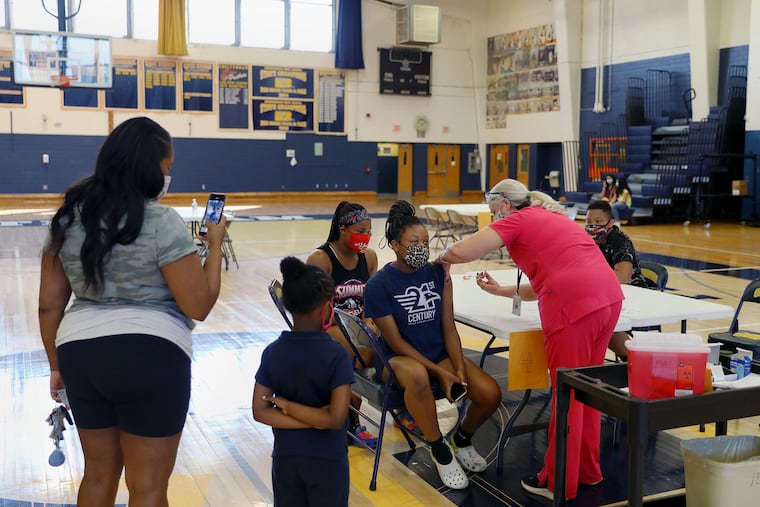Fear is our worst enemy when it comes to COVID-19 and children | Opinion
While pediatric COVID-19 cases are numerically increasing, the disease has not become more serious in children.

Just as children return to classrooms, our country, unfortunately, finds itself in the midst of a COVID-19 resurgence that is heightening anxiety and leading many school communities to revisit their health and safety plans. As they do, it is essential that school leaders, teachers, and families are equipped with accurate information on the risk to themselves and their children.
It is easy to panic upon hearing of a teenager who suddenly died from COVID-19, or of an intensive care unit caring for multiple COVID-infected children on ventilators. But overreactions to these rare events can lead to interventions that might only divide communities further. What is needed now is transparency on what the data on children and COVID-19 are showing. That story is more reassuring.
It is true that with more than 65% of adults in the U.S. fully vaccinated, a greater number of children are becoming infected during this resurgence than before. However, this should not be surprising as children were out and about more this summer than last, often without masks, and are now attending after-school activities, participating in larger gatherings, and traveling more with their families. We’re also facing a delta variant that is more contagious, a challenge compounded by stalled vaccination efforts across the country.
» READ MORE: Many teens struggle with COVID-19 anxiety and depression. Which therapy is best? | Expert Opinion
Still, it is important to understand that while pediatric COVID-19 cases are numerically increasing, the disease has not become more serious in children. While more children have been hospitalized in this wave than prior ones, the overall numbers nationwide remain low. While nearly 100,000 adults in the U.S. are currently hospitalized for COVID-19, the pediatric hospital census (patient count) has remained near 1,500 children. The American Academy of Pediatrics weekly report from Sept. 2 on COVID-19 and children notes that the proportion of children hospitalized among all those infected remains at 0.9%, unchanged over the last year.
Given the uneven uptake of vaccines nationwide, it isn’t surprising that most of these pediatric hospitalizations (nearly 70%) have been in the South. Just two states, Florida and Texas, accounted for nearly 30% of all children hospitalized last week, where the pediatric census reached 175 and 260 children, respectively. Areas throughout Alabama, Georgia, Louisiana, and Tennessee have some of the lowest vaccination rates and have also been beset with similarly increasing pediatric hospitalizations, but at lower absolute numbers given these states’ smaller populations.
There is also a growing narrative that children’s hospitals are experiencing capacity constraints. This has been true for some children’s hospitals in the South, particularly those that provide care for large regions, but for most children’s hospitals in the country, current capacity constraints are not driven by COVID-19.
Non-COVID-19 viral illnesses are rapidly reemerging among children as they increasingly mingle. Furthermore, more youth are coming to children’s hospitals with psychiatric emergencies, signs that the youth behavioral health crisis that began before the pandemic has been exacerbated by the prolonged social isolation children have had to endure.
» READ MORE: Philly parent: Schools need more input from families when making critical decisions | Opinion
The risk of hospitalization from COVID-related complications is high enough for us to strongly recommend that families immunize their older children and that we move as quickly as possible to approve vaccines for children under 12 years of age. But it is not sufficient to alter guidance to families about risk to their children.
While we tend to focus on school safety plans as the primary way to protect children against COVID-19 transmission, the best intervention is to surround them with vaccinated adults and ensure every adult they might encounter is also vaccinated. Texas — where, per data from the Centers for Disease Control and Prevention and the U.S. Department of Health and Human Services, only 57% of adults were fully vaccinated by mid-August during the height of the summer resurgence — has seen some of the highest numbers of children hospitalized. Approximately 10% of all U.S. children live in Texas, yet more than 20% of all hospitalized children were in Texas hospital beds last week. In contrast, California — where 67% of adults were fully vaccinated by mid-August and 12% of the country’s children live — saw a peak census of only 8% of all children nationally. In our own area, Children’s Hospital of Philadelphia did not surpass a census of 10 children with COVID-19 throughout July and August, part of a broader Northeastern trend where hospital census has plateaued at 70 children in the entire region during the last two weeks before Labor Day.
During this uncertain time, scary anecdotes can do more harm than good. A more data-driven assessment of the COVID-19 risk to children as they return to school can better guide communities toward practical local solutions for navigating this year.
It is critically important that communities make their decisions locally with unbiased, tempered information on the true risk, alongside a frank discussion about those interventions — namely adult vaccination — that can best protect children outside of school walls.
David Rubin is the director of PolicyLab at Children’s Hospital of Philadelphia (CHOP). Susan Coffin is a faculty member at PolicyLab and a professor in the division of infectious diseases at CHOP.